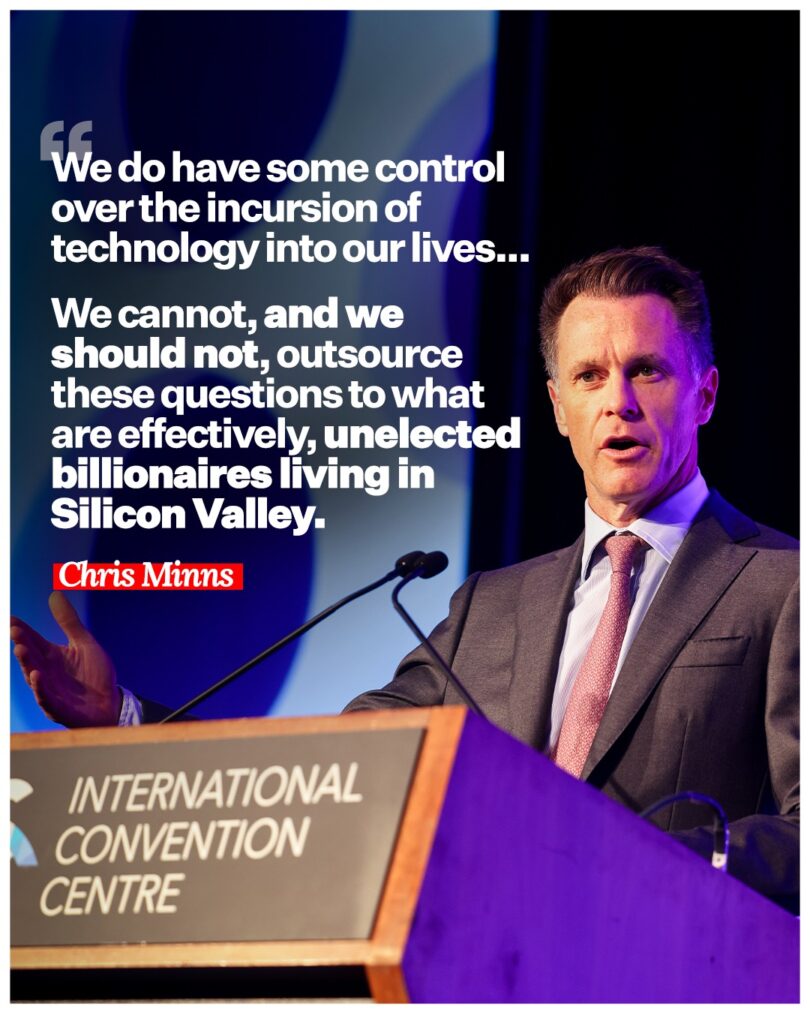OPENING ADDRESS TO SOCIAL MEDIA SUMMIT BY NSW PREMIER CHRIS MINNS
C
SPEECH-CHRIS MINNS,PREMIER OF NEW SOUTH WALES
OPENING ADDRESS TO THE SOCIAL MEDIA SUMMIT
INTERNATIONAL CONVENTION CENTRE, SYDNEY
THURSDAY, 10 OCTOBER 2024
Thank you so much Matty and thank you to Yvonne Weldon for that Acknowledgement of Country.
What a beautiful and generous gesture for our Indigenous leaders to welcome us to this land.
It’s such an important part of the opening of summits like this, and that practice will continue in New South Wales under our government. We think it’s fundamentally important and intrinsic to who we are as a people in this state and this country. Thank you so much, Yvonne.
I’d like to acknowledge the Gadigal people on whose land we meet today, and can we just get a round of applause for all of the young people in the room today.
Many of them are at university in the closing stages of their degrees, but a lot of them are in the midst of school holidays, so it’s a massive effort to put aside the school holidays and be here with all of us, and we genuinely appreciate it.
I want to thank you all for coming today, and for the many people that came across the state, and even across the country, to take part in what is a unique, cross state summit between New South Wales and South Australia.
We’re not used to having policy discussions between two states, that don’t involve a border dispute, or us demanding more money from the Commonwealth government.
Or swapping jokes about Victoria. Which, we’re happy to do a little bit later.
But this is an important issue that is fundamental to our two states, and I’d like to see more of it in the Commonwealth the states working together on issues that are affecting the people of New South Wales, and in this case, South Australia, but genuinely all of us.
I’d also like to acknowledge the work that’s been done by South Australia and the Premier Peter Malinauskas, who is going to speak in a moment, in firstly instituting what was a brave and nation leading mobile phone ban across his state.
Now that was the first in the country to do so, and then secondly, for commissioning the independent legal examination by Justice Robert French into restricting access to social media for children, and for really getting the ball rolling when it comes to reform for the social media space.
It’s been nation leading, an important conversation, and really been driven by the Premier of South Australia and it’s fantastic that he’s here with us today.
Delegates, a year ago this state followed the decision of the South Australian government and restricted the use of mobile phones in public schools across the state.
But of all the announcements we made at the last election and I think, the Deputy Premier would agree, hundreds of commitments and billions of dollars worth of election commitments and projects that were at stake, not many other issues generated more controversy than what was colloquially called, ‘the phone ban.’
Now, we had our supporters, lots of parents and some teachers.
But there was also a backlash, mostly from students themselves, who genuinely didn’t know, as they expressed to me and Prue, how they were going to get through the day to day without their phones being in their laps.
Now, I think it would be easy speaking today, to ridicule those kids, bear in mind that adults have exactly the same addictions in their life.
And if we put ourselves in the shoes of children, young people, students, if we think about the life they’re currently living, that fear is completely understandable.
And it’s not just kids. It’s all of us.
We’ve all got these devices in our pockets, all day, whispering in our ears that we need to log on, we need to check our notifications, we need to watch this video, we can’t stop scrolling because we don’t know what the next image is that we’ll see.
So I can understand where that reluctance came from.
The fortunate thing about the policy that was instituted by the government is that it was, in effect, a natural experiment.
We had the same group of people, in the same setting, before and after the phone restrictions came in, so we could test the impact it was having in each individual school.
And delegates, the impact has been massive.
Since the ban, teachers have reported a reduction in behavioural issues, fewer suspensions, higher attendance rates, less bullying in the school room and the school yard.
We’ve seen more concentration in our classrooms and stronger connections outside of it.
In fact, I recently met with the Deputy Premier and Minister for Education, students at East Hills, who told me that they’d grown much closer as a result of the change, and that their friendships had strengthened, and that phones had been left off the playground.
We’ve also seen a welcome return to active play at lunchtime, with more sport, more exercise, more physical activity.
In just one example, teachers at a school in Blacktown have reported an extra fifty minutes of learning time a day, with fewer confrontations between students and teachers and students and students, and a reduction in online bullying.
So, we believe the evidence is overwhelming. The changes to phones in school has been a huge success.
And from that success I think we can learn a few lessons as we roll into this summit and confront some of the changes that we want to see in the country.
Firstly, that we do have some control over the incursion of technology into our lives.
That it’s not all a one way street. That is, of more technology, forever and ever, with no restrictions or no regulations on the other side.
Secondly, that we can in a democracy, take the best of technology, while preserving space for other things – important things – like concentrating on a task at hand, the mental health of people in our community and fundamentally, human connection. Physical, human connection between people.
We cannot, and we should not, outsource these questions to what are effectively, unelected billionaires living in Silicon Valley.
And thirdly, we’ve got the right to be suspicious of the impact social media is having on our society and our young people in particular. Our first responsibility should be to do no harm.
A healthy scepticism doesn’t make you backward or nostalgic or some kind of modern luddite.
If you’re concerned about your kids and the impact these sites are having on their mental health, or their body image, or their sense of personal confidence in the world, well we think that you’re right to be concerned.
And we want to get the information on the table to make the best decisions, not just from governments, but for communities and families.
Studies have found that kids who spent more than three hours a day on social media are twice as likely to experience poor mental health away from social media and that includes depression and anxiety.
And many people are worried about the ability to concentrate – on your ability to concentrate, for that matter. That’s adults as well.
To finish your book like we used to or being concerned and concentrated on the work that’s at hand.
Now, these are reasons to take action, because, by any measure, our ability to focus as a society has fallen as social media use and its ubiquitous nature has risen.
Research bears this out. A worldwide OECD Programme for International Student Assessment (PISA) found in 2022, that the use of phones had an impact on classroom learning.
Across the OECD, 65% of students reported being distracted by using digital devices in at least some of the maths classes they were taking.
The report found that digital distraction has a strong association with learning outcomes, as students who reported being distracted by other students using these devices scored 15 points lower in some of those annual standardised tests.
To illustrate how much of a drain that 15 points is, it’s the equivalent of three-quarters of a year of learning, in maths or any subject in education. A massive deficiency.
And if you’re worried about our civil society and our democracy, or the state of our public debate. If you’re watching a relative fall down what can be an extreme rabbit hole in one of the dark corners of the internet, then think many people in this room share these concerns and are up for practical ways of making a difference.
We know these algorithms are encouraging extremist views, because that’s how they keep you clicking on the site for longer periods of time.
Delegates, over the next two days, you will hear from some of the world’s most credentialed experts on these questions, from Australia and around the world.
Soon you will hear from Dr Jean Twenge, who’s come here from the United States, Professor of Psychology at San Diego State University. The author of more than 190 scientific articles and publications on the link between adolescent mental health and social media.
A bit later on, we’ll have a second keynote address from Frances Haugen, who’s a courageous whistleblower from Meta, who revealed how these sites are knowingly damaging young minds, while allowing misinformation to run rampant through the corridors of the internet.
And throughout the day and in Adelaide tomorrow, we’ll hear from people on the frontline. From parents, local experts and most importantly from young people themselves.
Who are negotiating these questions in their own lives without any historical frame of reference.
This has been repeatedly pointed out, it’s almost a global, unregulated experiment on young people.
Delegates throughout these discussions, it’s important I think, that we maintain a practical focus.
We need to understand our problem but perhaps more importantly, we need the tools that can effectively respond to the problems.
As we’ve shown with changes to phones in schools that it is possible, as long as we’re targeted and determined as well as being realistic.
This summit is not about turning back the clock, or recreating the world as it was before smart phones and social media.
Even if we wanted to, we couldn’t.
But the truth is, we don’t want to.
Technology and the internet has driven progress. It has unleashed new forms of creativity. It has connected us in new and wonderful ways and it has helped people grow and start new businesses across the country and the world, linking up communities that previously would never have run into one other.
What we’re here to do is make sure this technology is working for us, rather than us working for the technology.
It’s a mighty task, one of the great questions I think of the twenty first century.
But the only way we can begin to answer it to start right here.
To clearly describe the kind of digital lives we want children to have.
And to develop the kind of interventions we can make, for a healthier, happier, and ultimately better and productive society.
This is something we’ve all been working out in our own way, as parents, as citizens, as voters, as individuals on the internet.
But as individuals, there’s only so much we can do.
As a parent, you’re facing up against some of the biggest companies that have ever existed in the global economy.
Which is why we believe we should confront these challenges as a community.
We’re not just consumers of technology.
We’re citizens in a democracy.
It’s up to us to decide the kind of country that we want to live in and the lives we want for our children and the next generation.
And that’s what this summit is about.
It’s a huge responsibility but we firmly believe, both Peter and myself, that if we assemble the best information, if we can formulate and articulate the right policies, then we can set a new course and take back some control.
And most importantly, give our kids the best chance for a full and happy life.






